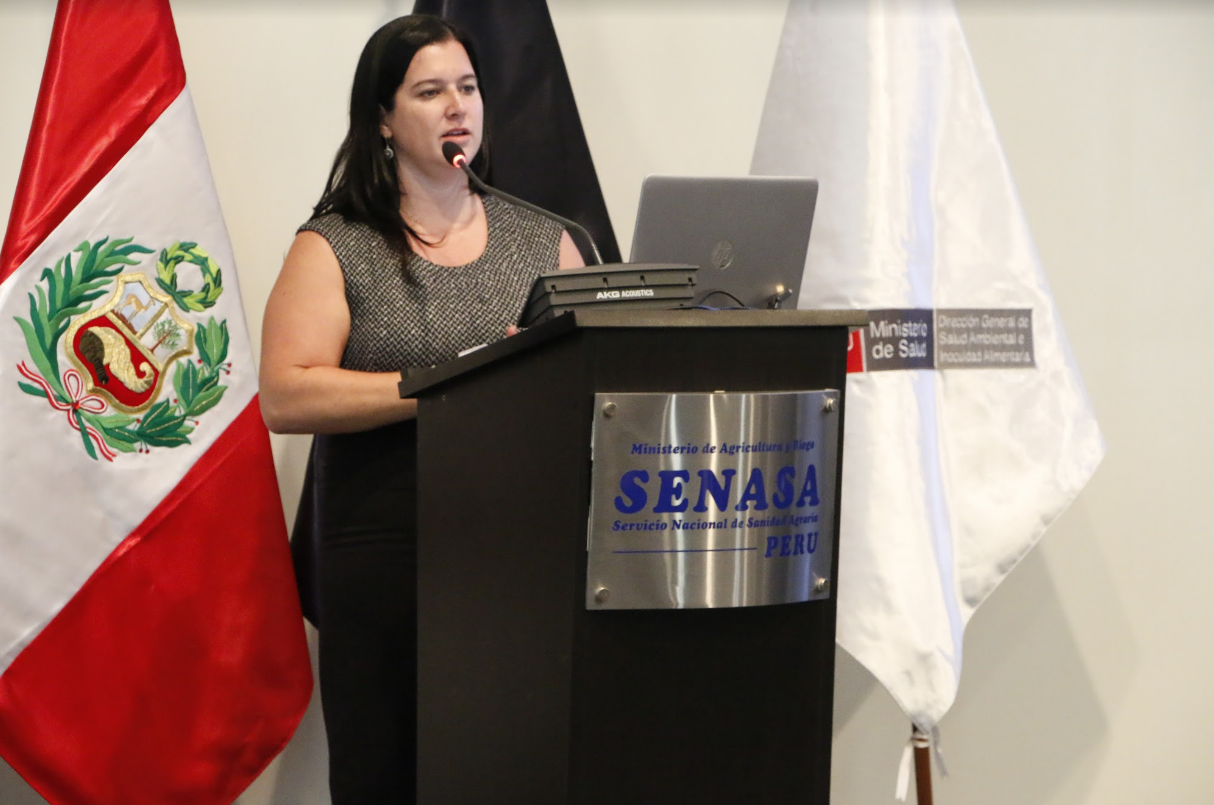Chile and Peru collaborate to fortify Codex work
Chilean Codex Committee members Cassandra Pacheco and Constanza Vergara led a training workshop in Lima, Peru, on July 31 and August 2, to strengthen the technical and scientific capacities of the members of the Peruvian Codex Committee to better engage in the risk management work of the Codex Alimentarius
The workshop was attended by 40 delegates, representing industry, academia, consumers and the national government. Part of the Inter-American Institute for Cooperation on Agriculture (IICA) twinning programme, the meeting focussed mainly on the work of the Codex Committees on Food Additives (CCFA), Contaminants in Foods (CCCF), Residues of Veterinary Drugs in Foods (CCRVDF) and Pesticide Residues (CCPR).
“Collaboration is one of the core values of the Codex partnership. The Codex Secretariat is delighted to see the Coordinator of CCLAC engaging with fellow Members to strengthen local knowledge on Codex, which will ultimately benefit food safety both locally and globally as well as international trade”
- Sarah Cahill, Senior Food Standards Officer, Codex Secretariat
Speakers from Chile, Costa Rica and Peru shared their experiences and knowledge with participants. The Codex Contact Point in Chile, Cassandra Pacheco, spoke about good practices in the Codex Alimentarius, Chile’s experience in managing Codex work. She also ran session on data input on the GEMS/Food Web Site, a platform of the Global Environment Monitoring System, Food Contamination Monitoring and Assessment Programme, which informs governments and the Codex Alimentarius Commission on levels and trends of contaminants in foods.

Constanza Vergara, ACHIPIA
Constanza Vergara, also of the Chilean Agency for Food Safety and Quality, explained risk analysis, illustrating how risk assessments are conducted to establish maximum residue limits (MRLs) for chemical contaminants in food and to assess microbiological hazards. She also addressed the areas of risk perception, risk management and risk communication.
Read more (Spanish)
At the heart of the Codex mandate are the core values of collaboration, inclusiveness, consensus building and transparency. Governmental and non-governmental, public and private organizations alike play a vital role in ensuring Codex texts are of the highest quality and based on sound science.
Codex would have little authority in the field of international standard setting if it did not welcome and acknowledge the valuable contributions made by observers. Expert technical bodies, industry and consumer associations
contribute to the standard-setting process in a spirit of openness, collaboration and transparency.
Intergovernmental organizations (IGOs) and international non-governmental organizations (NGOs) can apply for observer status in Codex in order to attend and put forward their views at every stage of the standard-setting process.
 Current Codex Alimentarius Commission
Current Codex Alimentarius Commission
Chile and Peru collaborate to fortify Codex work
Chilean Codex Committee members Cassandra Pacheco and Constanza Vergara led a training workshop in Lima, Peru, on July 31 and August 2, to strengthen the technical and scientific capacities of the members of the Peruvian Codex Committee to better engage in the risk management work of the Codex Alimentarius
The workshop was attended by 40 delegates, representing industry, academia, consumers and the national government. Part of the Inter-American Institute for Cooperation on Agriculture (IICA) twinning programme, the meeting focussed mainly on the work of the Codex Committees on Food Additives (CCFA), Contaminants in Foods (CCCF), Residues of Veterinary Drugs in Foods (CCRVDF) and Pesticide Residues (CCPR).
“Collaboration is one of the core values of the Codex partnership. The Codex Secretariat is delighted to see the Coordinator of CCLAC engaging with fellow Members to strengthen local knowledge on Codex, which will ultimately benefit food safety both locally and globally as well as international trade”
- Sarah Cahill, Senior Food Standards Officer, Codex Secretariat
Speakers from Chile, Costa Rica and Peru shared their experiences and knowledge with participants. The Codex Contact Point in Chile, Cassandra Pacheco, spoke about good practices in the Codex Alimentarius, Chile’s experience in managing Codex work. She also ran session on data input on the GEMS/Food Web Site, a platform of the Global Environment Monitoring System, Food Contamination Monitoring and Assessment Programme, which informs governments and the Codex Alimentarius Commission on levels and trends of contaminants in foods.

Constanza Vergara, ACHIPIA
Constanza Vergara, also of the Chilean Agency for Food Safety and Quality, explained risk analysis, illustrating how risk assessments are conducted to establish maximum residue limits (MRLs) for chemical contaminants in food and to assess microbiological hazards. She also addressed the areas of risk perception, risk management and risk communication.
Read more (Spanish)
 Codex and Observer
Codex and Observer
around the world since ancient times.
We might not always know where it comes from,
but we expect it to be available, safe and of good quality.










Leave a comment